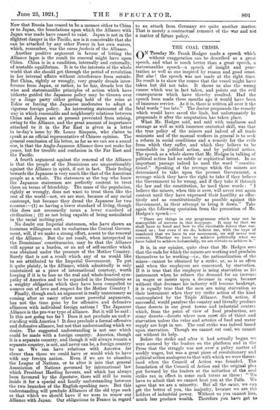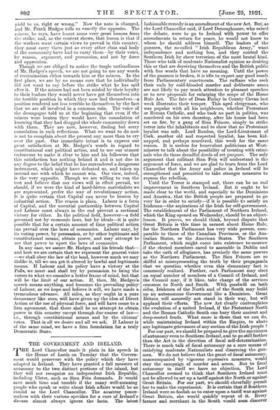THE COAL CRISIS.
ON Tuesday Mr. Frank Hodges made a speech which without exaggeration texaggeration can be described as a great speech, and what is much better than a great speech, a statesmanlike speech—a speech of insight and pene- tration as well as one inspired by reason and good sense. But alas ! the speech was not made at the right time. Its result is to show the course that the vessel might have taken but did not take. It shows us also the wrong course which was in fact taken, and points out the evil consequences which have thereby resulted. Had the speech been made three months ago it would have been of immense service. As it is, there is written all over it the fatal words " too late." The doctor propounds the remedy which would have saved the limb, but unfortunately he propounds it after the amputation has taken place. What Mr. Hodges said, and said with manliness and courage as well as with immense oratorical skill, was that the true policy of the miners and indeed of all trade unionists and of the manual workers in general is to seek a reform in social conditions and a remedy for the evils from which they suffer, and which they believe to be remediable in political action, and by political action. The speech as a whole shows that Mr. Hodges in talking of political action had no subtle or sophistical intent. In an important passage indeed he used the word " constitu- tional." Speaking of the revenge which the miners are determined to take upon the present Government, a revenge which they have the right to take if they believe the Government to be wrong, and if they take it through the law and the constitution, he used these words : " I believe the miners, when this is over, will never rest again content until they have expressed their hostility as effec- tively and as constitutionally as possible against this Government, in their attempt to bring it down." Take again the following quotation from the peroration of Mr.
Hodges's speech :— " There are things in our programme which may not ho susceptible of success in this stoppage. It may be that we shall have to bond and bow to the inevitable forces that sur- round us ; but oven if we do, believe me, with the type of manhood that we have in our movement, we will never rest content. Whether we have to achieve politically whet we have failed to achieve industrially, we are certain to achieve it."
It is, in our opinion, quite clear that Mr. Hodges sees that the ends for which the miners are working and proclaim themselves to be working—i.e., the nationalization of the mines—cannot be obtained by a strike, or, as is so often said when the employers are concerned, by starvation. If it is true that the employer is using starvation as his instrument when he refuses the demand for an increase in wages or insists upon a decrease in wages, because without that decrease his industry will become bankrupt, it is equally true that the men are using starvation as their instrument when they try strike action of the kind contemplated by the Triple Alliance. Such action, if successful, would paralyse the country and literally produce those deserts in our great towns and industrial centres which, from the point of view of food production, are stony deserts—deserts where men must die of thirst and starvation unless the veins and arteries of food and water supply are kept in use. The coal strike was indeed based upon starvation. Though we cannot eat coal, we cannot eat without its help. Before the strike and after it had actually begun we were assured by the leaders on the platform and in the Press that the struggle was not over a paltry matter of weekly wages, but was a great piece of revolutionary and political action analogous to that with which we were threat- ened when the Council of Action was founded. The foundation of the Council of Action and the original plea put forward by the leaders at the initiation of the coal strike ran in effect in some such terms as those : " We have to admit that we cannot beat you at the Polls. We agree that we are a minority. But all the same, we can get the better of you, the majority, because we are the holders of industrial power. Without us you cannot live, much less produce wealth. Therefore you have got to yield to us, right or wrong." Now the note is changed, and Mt. Frank Hodges tells us exactly the opposite. The miners, he says, have learnt some very great lessons from- the strike, and, as-the context shows, that lesson is that if the workers want certain views to prevail in this country, they. must carry them just as every other. class and body of the community have had-to carry them—by their votes, by reason, argument, and persuasion, and not by force and oppression. Though we ,are obliged to notice the tragic untimeliness of Mr. Hodges's speech, we are not going to use any words of recrimination either towards him or the miners. In the first place, we are by no means sure that he individually did not want to say .before the strike what he has said after it. If the miners had not been misled by their loyalty to their leaders they would never have got themselves into the terrible position in which they now find themselves—a position rendered not less terrible. to themselves by the fart that we are all involved in a common ruin. The voice of the demagogue told us at the beginning that even if the miners were beaten they would have the consolation of knowing that they had dragged the whole community down with them. They are now, however, finding but sorry consolation in such reflections. What we want to do now is not to complain about the present any more than to cry over the past. Our immediate intent is to express our great satisfaction at Mr. Hodges's words in regard to constitutional and political action, and to use our utmost endeavour to make it clear to him and his followers that this satisfaction has nothing behind it and is not due in any degree to the belief that he has surrendered a dangerous, instrument, which might have defeated us, and taken up instead one with which he cannot win. Our view, indeed, is the very opposite. Though we are willing to run the test and believe that our views will in effect prevail, we should, if we were the kind of .hard-bitten materialists we are represented, prefer the way of revolutionary action. It is quite- certain that Capital can never be beaten by industrial action. The reason is plain. Labour is a form of Capital, and the essential partnership between Capital and Labour must always in the end prevent a sectional victory for either. In the political field, however—a field governed not -by economic laws, but by ideals—it is quite possible that for ascertain amount of time political action can prevail ever the laws of economics. Labour .may, by its voting,power, by.persuasion, or by other legitimate and constitutional means; obtain power, and may attempt to use that power to upset the laws of economics.
In any case, we assure Mr. Hodges and his friends that— and here we are certain that we represent the generalvoice —we shall.obey- the law of the land, however much we may dislike it, till we can get it altered by lawful and legitimate means. If Labour and its policy have a victory at the Polls, we must and shall try by persuasion to bring the voters to what we consider a better frame of mind, but that will be the .limit of our action. If, then, Mr. Hodges's speech means .anything, and becomes the prevailing policy of Labour, as we hope-and believe it will, we have made a tremendous advance. All sides, as they ought in a pure democracy like ours, will have given-up the idea of Direct Action or the use of physical-force, and will have come to a firm agreement, that there shall be no attempt :to obtain power in this country except through due course of law-- i.e., through constitutional means and by the citizens' votes. That-is all we desire and all we ask. If Labour is of the same mind, we have a firm foundation for a truly Democratic ,State.



































 Previous page
Previous page